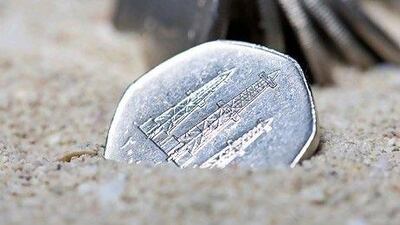The altruistic actions of central bankers often have far-reaching and unintended consequences.
Take, for example, the decision of the Irish financial authorities in September 2008 to guarantee all bank deposits in the country.
It was lauded as a splendid move at the time, putting the sovereign's money where its mouth was to halt the collapse of the banking system. But ultimately it led to the bankruptcy of the country and a bailout from the European Union.
While not as extreme a situation, the decision by the UAE Central Bank to put strict limits on banks' exposures to government-related entities (GREs) could have all sorts of unforeseen and undesirable consequences.
The Central Bank's intentions are entirely understandable and appropriate. The country's banks have been badly affected by the fall in asset values that occurred as a result of the shock to the global financial system.
In particular, plummeting prices for property and financial assets have caused banks to incur big write-offs against their loans to local corporates. UAE banks, which had done their bit to encourage growth in the boom years by extending cheap credit to other parts of the economy, were then left nursing their financial wounds.
There is a genuine and laudable desire that this should not happen again. There is also a need to stimulate bank lending to the private sector, which has been crowded out by the needs of public-sector organisations.
So last week, after a suitable notice period, the Central Bank issued new rules limiting total lending to GREs to 100 per cent of capital, with lending to any single GRE not to exceed 25 per cent.
On the face of it, that looks entirely reasonable. Economists estimate total lending to the public sector accounts for 75 per cent of UAE banks' capital and reserves.
However, behind those aggregate figures, there are some pretty alarming exposures for individual banks. Emirates NBD and National Bank of Abu Dhabi, for example, have had exposure estimated by Deutsche Bank (admittedly a rival to both) at 192 and 199 per cent respectively.
This is where the law of unintended consequences comes in. If the Central Bank ruling is strictly applied, local banks should now be in the process of writing down, or selling off, the loan book in excess of the 100 per cent limit.
Neither is an attractive option. To write down billions of dirhams worth of loans would cause the banks another series of profit-destroying provisions; to sell in the secondary debt market (assuming there are buyers) could be interpreted as a distress sale, with another set of write-downs. Credit ratings of both lenders and borrowers would be hit.
Would buyers even appear for such large amounts of UAE debt? Europeans are unlikely; they have quite enough of that sort of thing at home, thank you. Americans might be tempted at the right price and Asians, too. But again it would not be to the UAE's advantage to engage in a self-enforced global auction of debts.
The banks want a different solution. They argue plausibly that these loans are as close to sovereign debt as it is possible to be. For the main part, they are owed by companies - financial, industrial and commercial - that are at the core of the nation's economic strategy.
This is not to argue for a government guarantee along Irish lines but it does ask the Central Bank to recognise the country's economic reality: an energy-rich state backed by the best infrastructure in the region with high levels of foreign reserves and GDP growth prospects the Americans or Europeans would die for.
The Central Bank's motives are impeccable but it must think through the long-term consequences.

